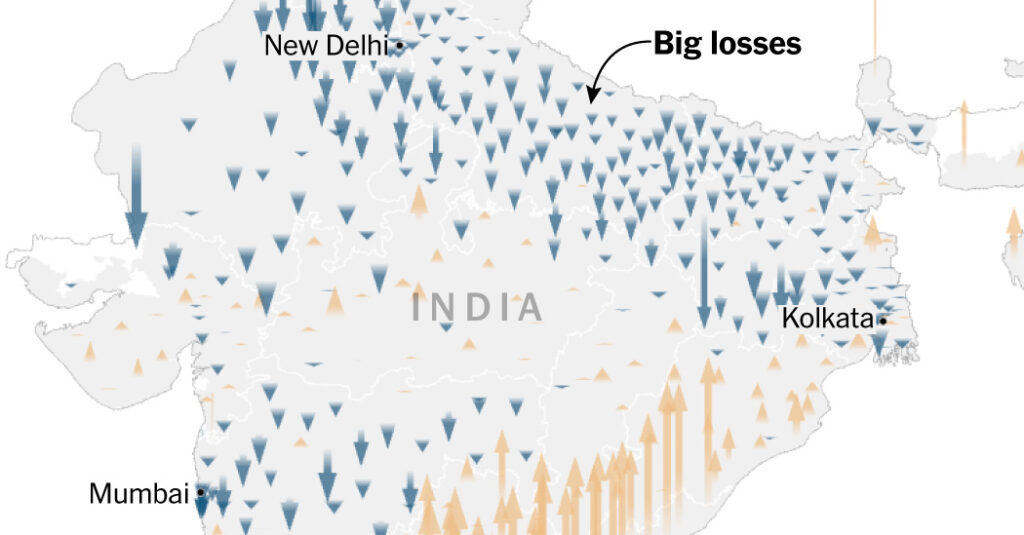Narendra Modi has set a lofty goal for the election, which he hopes will carry him into a legacy-defining third term as prime minister: winning a stunning majority that will see his party consolidate its status as the only logical choice to lead India in the coming years.
To that end, his Bharatiya Janata Party (BJP) aims to expand its deep support in India’s densely populated north, the so-called cow belt, while also making significant gains in the country’s south, which has become more resistant to the party’s Hindutva policies. -Nationalist agenda.
But when the election results came in on Tuesday, Modi’s plans had made little progress. Not only did his party fall far short of its goal of winning more than 400 of the 543 parliamentary seats. It fell so sharply – losing more than 60 seats – that it no longer holds a majority in parliament.
To stay in office, the powerful Modi is now forced to do something that does not come naturally to him: work with others to form political alliances. The alliance, known as the National Democratic Alliance (NDA), will face a reinvigorated political opposition led by the Congress party, which has improved significantly since the last election in 2019.
Modi’s NDA alliance lost huge swaths of territory in this election
The BJP’s losses were spread across the country, from Maharashtra in the west to West Bengal in the east. But Modi’s biggest setback has come in the most unexpected places: his party is deeply entrenched in the north and has strong support for its Hindu nationalist ideology.
Some of Modi’s tactics appear to be backfiring in the region, perhaps because candidates from his own party are seen as having little to offer after a decade in power. However, these losses were partially offset by gains in the southern regions, where the BJP, as a new entrant, had barely made a footprint in the past but where its message was better received.
In Uttar Pradesh, India’s largest state with 240 million people, the BJP won just 33 seats, down from 62 in the last election. It was in the northern state that Modi inaugurated the lavish Ram temple in January, seen as one of his biggest contributions to his Hindu support base. But the BJP’s advocacy of its Hindu-first policies has turned off many lower-caste voters, who are more concerned about issues such as unemployment, inflation and social justice.
One of the biggest surprises is in the city of Ayodhya, home to the Rama Temple. The BJP lost seats in the city and others in neighboring districts.
In the key state of Maharashtra, home to India’s business and entertainment capital Mumbai, the BJP won just nine seats, down from 23 in the last election. The party’s coalition partners suffered even greater losses.
The vote was seen as a verdict on the BJP’s heavy-handed approach to reshaping the state’s political landscape. The BJP has used pressure from government institutions and the lure of money and power to split the state’s two largest parties. However, the split saw one faction of each party align with the BJP, a move that backfired: In what was seen as a sympathy vote, the original factions of the two parties defeated their BJP allies by a wide margin.
The BJP does have some good news: It continues to expand support in the south, where the party has struggled to build a lasting foothold. It won a seat for the first time in Left-dominated Kerala and several seats in Telangana.
NDA alliance gains territory in east and south
The party’s most impressive victory came in the eastern state of Odisha. The state is part of the “tribal belt” that stretches across central India and is the only region where the BJP enjoys unified support. The BJP’s Hindu-first politics and welfare subtly target its relatively poor communities.
But the party’s gains in eastern and southern India were nowhere near enough to make up for its losses in the north. Now, with Mr Modi losing the landslide victory he sought, the nation will look to see how he responds. Some of the pressure on Indian democracy may be relieved as Modi is forced to consult with coalition partners who can curb his more authoritarian tendencies. Or he might crack down more harshly than before, fearing that he will lose more ground to a resurgent opposition.

